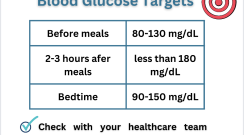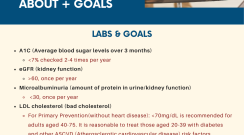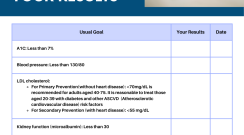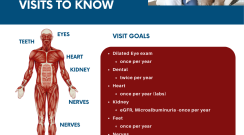Knowing important labs and numbers is crucial for diabetes patients to effectively manage their condition and prevent complications. Regular monitoring of blood glucose levels, typically through the A1C test, helps assess long-term glucose control. Blood pressure and cholesterol levels are also important indicators of cardiovascular health, which is particularly relevant for individuals with diabetes who are at higher risk of heart disease. Additionally, monitoring kidney function through tests like serum creatinine and urine albumin-to-creatinine ratio can detect early signs of kidney damage, a common complication of diabetes. Regular eye exams, including dilated eye exams, are essential for detecting diabetic retinopathy, a condition that can lead to vision loss if left untreated. Finally, foot exams and neuropathy screening help identify potential nerve damage and foot complications. By staying vigilant and monitoring these key metrics, diabetes patients can take proactive steps to manage their condition and maintain overall health.
- Posted: 28 April 2023
General blood glucose targets as a reference. Always check with your healthcare team as your target numbers may differ.
Topics: Diabetes Management
- Posted: 23 May 2023
Diabetes testing and target goals play a crucial role in managing diabetes effectively. Here are the key aspects related to diabetes testing and target goals.
- Posted: 09 February 2023
People with diabetes are twice as likely to have high blood pressure. If high blood pressure is left untreated, it can lead to stroke or a heart attack. Why else is blood pressure important and how often should it be checked?
- Posted: 08 February 2023
Managing your cholesterol levels helps to lower the risks of severe, life threatening complications from diabetes.
- Posted: 08 February 2023
Having diabetes means you're at a higher risk for serious complications of the kidney. The microalbumin and eGFR tests help to detect early signs of kidney damage.
- Posted: 12 March 2024
Keeping track of your results is crucial in managing diabetes as it allows you to monitor your progress and make informed decisions about your health. By regularly monitoring your blood glucose levels, blood pressure, and cholesterol, you can identify patterns, spot trends, and detect any deviations from your target ranges early on. This proactive approach enables you to adjust your treatment plan, lifestyle habits, and medication regimen as needed, ultimately leading to better diabetes management and improved overall health outcomes.
- Posted: 12 March 2024
Regular visits to your healthcare provider are essential for effectively managing diabetes. During these appointments, your healthcare provider will monitor your overall health and assess your diabetes management plan. These routine visits provide an opportunity to address any concerns, receive education and support, and prevent or manage complications associated with diabetes. It's important to attend these appointments regularly to stay on track with your diabetes care and maintain your overall well-being.








